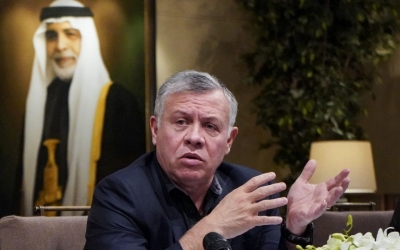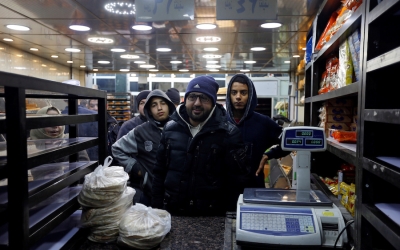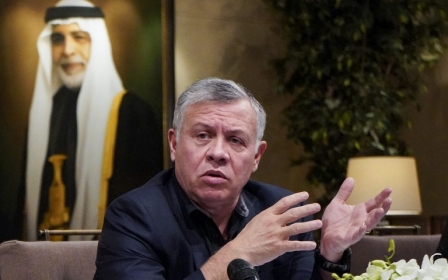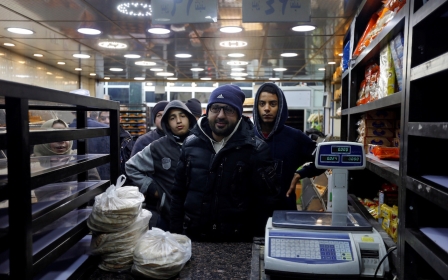Jordan fears striking teachers will inspire new wave of widespread protest
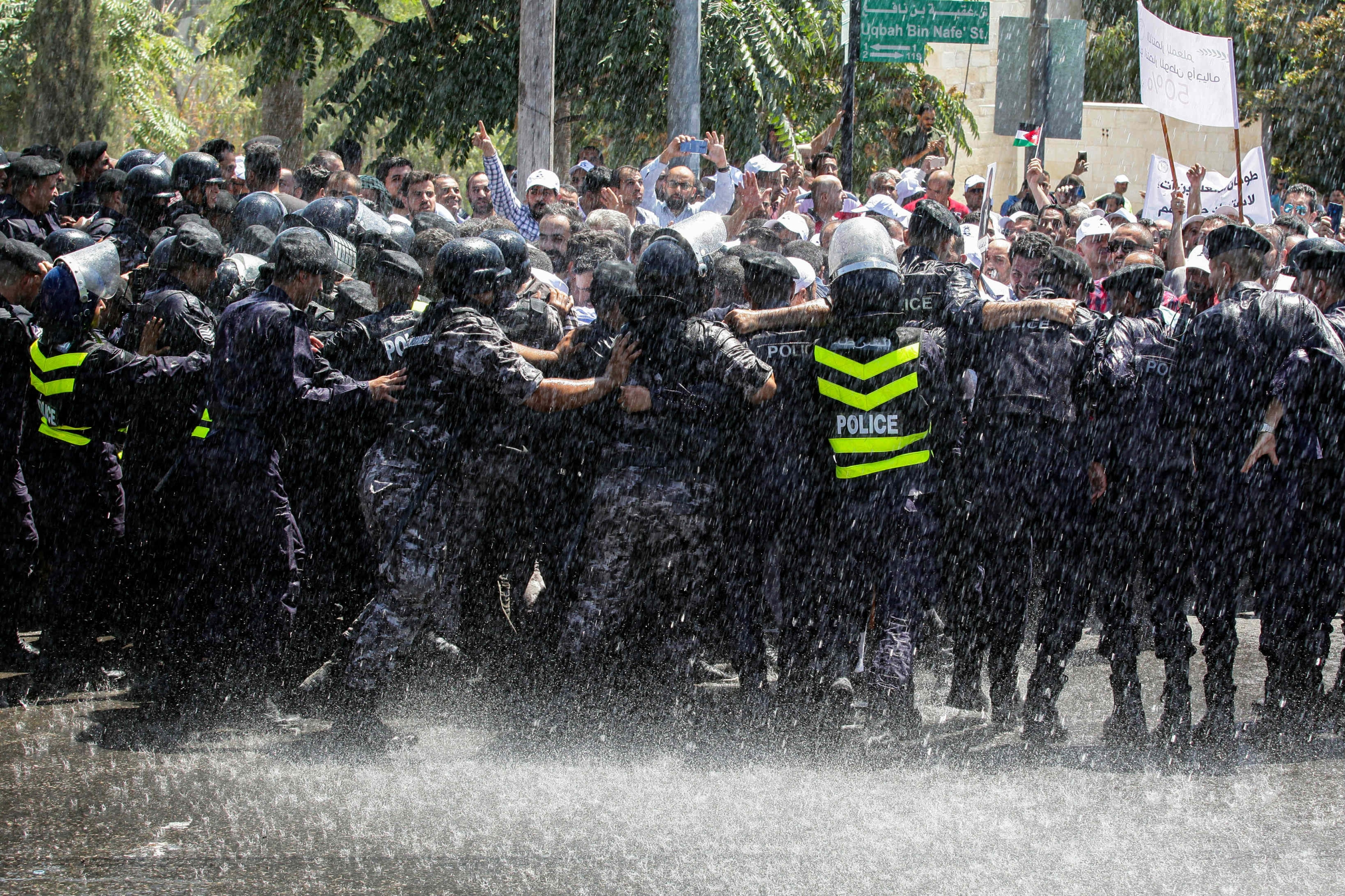
Talks between Jordan's government and the national teachers' union have so far failed to reach a resolution, as a strike entered its third day with the government seemingly unwilling to grant a salary increase it had promised teachers almost five years ago.
On Monday, Jordan's minister of education, Walid Maani, met with Naser Nawasreh, the deputy head of the country's teachers' union. But the two failed to resolve a teachers' strike over pay, which entered its third day on Tuesday.
Many had hoped that the three-hour meeting, held at the home of Ibrahim Badour, the head of the parliamentary education committee, would end the crisis involving 86,000 government teachers.
Having begun striking on Sunday morning, the teachers are demanding a 50 percent increase in their salaries, which was agreed upon in 2014.
Rather than a general increase, the government insists that only professional performance will be rewarded with more money.
In a statement published on its official Facebook account on Saturday, the Jordanian Teachers' Association (JTA) - also known as Jordan's Teachers' Syndicate - said the "open-ended" strike would begin on Sunday and continue until the increase was granted by the government.
The statement directed teachers across the country to attend official working hours but not enter classrooms or carry out official duties.
Nawasrah said the strike action was also a response to the authorities' handling of demonstrations on Thursday, when thousands were prevented from marching towards Prime Minister Omar al-Razzaz's office by security forces.
Protesters had gathered near the government headquarters in the capital Amman amid a heavy security presence.
Tear gas was then used to disperse parts of the crowd amid confrontations with police.
Forced to work at night
In a live broadcast on his Facebook page, Nawasreh said that the government had failed to make a credible offer during the talks.
"They didn't talk about the teachers' raise of 50 percent. Instead they want to avoid our demands and as a result the strike will continue until we get our pay raise."
If the teachers continue to insist on the pay rise, which was promised by the government of Abdullah Ensour in 2014, it is estimated that it would cost the Jordanian treasury $157m, which the government says is not available.
'They want to avoid our demands and as a result the strike will continue until we get our pay raise'
- Naser Nawasreh, union official
The average salary of a Jordanian teacher is $565 a month, the purchasing power of which has been depleted because of inflation and new taxes that have been levied over recent years.
Speaking to Middle East Eye, Hisham Haisieh, a teacher from the Sahab area south of Amman, said: "Teachers face a difficult economic situation which often forces them to work at night.
"The pay rise would raise the base salary of a teacher by about $200, plus it will increase the take home pay of the teacher by between $50 to $211 in additional raises based on experience and the grade of the teacher.”
'Things escalated quickly'
Fifty-seven teachers were detained during Thursday's protests but later released.
In a news conference on Saturday, some of those detained accused the security forces of forcing them to remove their clothes during their detention in one of the police stations.
Action over the arrests has become a new condition for ending the strike, with calls to hold the violators accountable and for Salameh Hamad, the minister of the interior, to be fired.
Nawasreh told MEE that originally there were no plans for an "open-ended" strike until the end of September.
“We just wanted to have a demonstration on Thursday outside the government headquarters demanding an improvement of the salaries due to the harsh economic situation," he said.
"But things escalated quickly when the teachers were attacked.
"We will not return to classes until those who attacked our teachers are held accountable and the minister of interior fired."
'The government is afraid'
Jumana Ghunaimat, a government spokesperson, said on Sunday that the government "respects the teachers and the teaching profession" but made no mention of any action against the police who attacked the teachers.
The current impasse is similar to the crisis in 2018 when professional unions and an angry public protested against the economic decisions of the government of Hani Mulki.
Those protests ended with the firing of Mulki and the appointment of Razzaz as prime minister.
Mohammad Essa, a member of the left-wing Popular Unity Party, told MEE that the government is in a do-or-die clash with the teachers' union.
'This is happening at a time of public anger, a public that is unhappy with the performance of the government'
- Mohammad Essa, Popular Unity Party
"The government is afraid that the virus of protests will spread to other sectors if it agrees to the demands of the teachers," he said.
This may explain why the government is so concerned about preventing the protest outside the government headquarters, with fears that the 2018 protests would be repeated, since the economic problems in Jordan have still not been properly addressed.
"This government was created after the protests of 2018 and it shameful that it is unwilling to meet with the protesting teachers and has tried to prevent them from protesting outside the government headquarters," said Essa.
"This is happening at a time of public anger, a public that is unhappy with the performance of the government, and amidst the detention of activists who are calling for political reform."
The teachers' protests have already encouraged a number of other professional unions to ask for improvements for their members who work in the public sector.
On Sunday, Ali Abbous, the head of the doctors' union, gave the government a week to carry out the implementation of incentives of $49 to $119 that were previously promised to them.
Ahmad al-Zoubi, the head of the engineers union, also called on Saturday for the government to pay a 10 percent increase to its members who have government jobs.
This article is available in French on Middle East Eye French edition.
Middle East Eye delivers independent and unrivalled coverage and analysis of the Middle East, North Africa and beyond. To learn more about republishing this content and the associated fees, please fill out this form. More about MEE can be found here.


